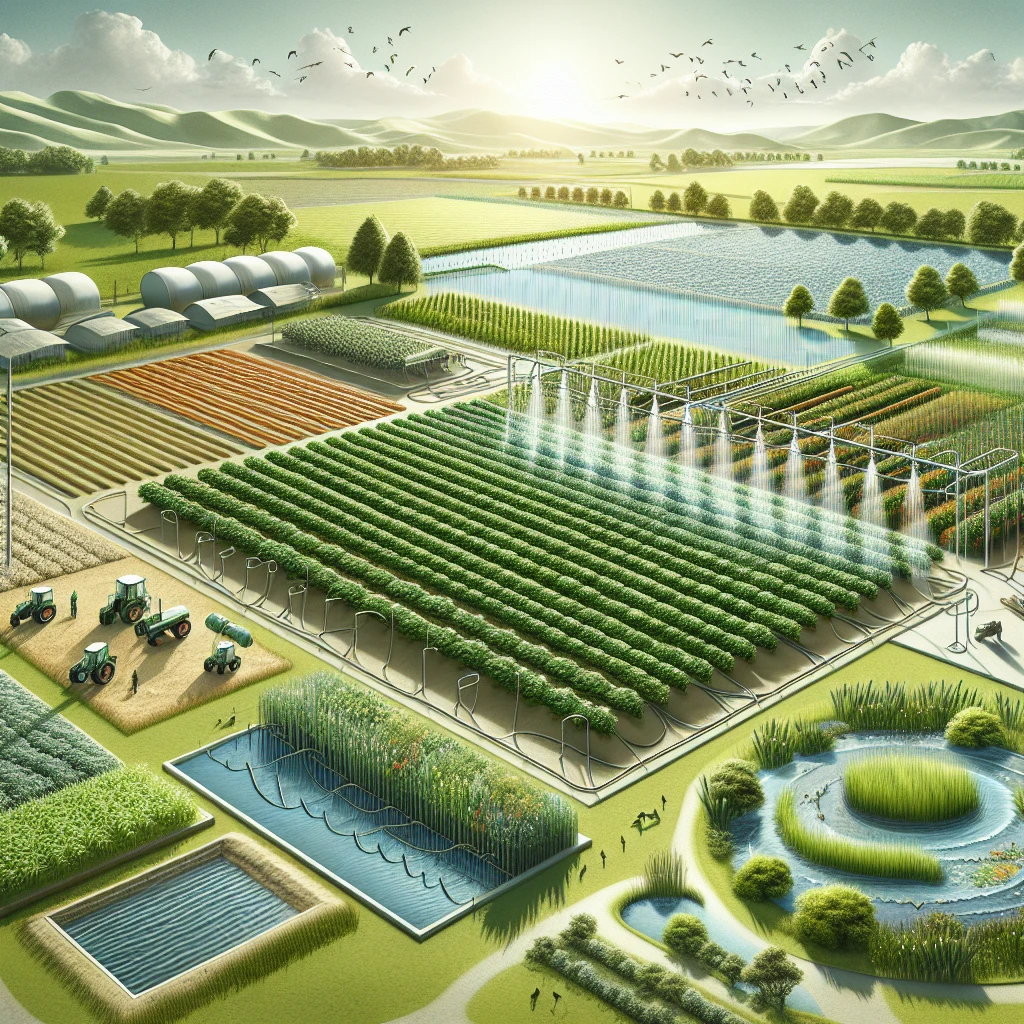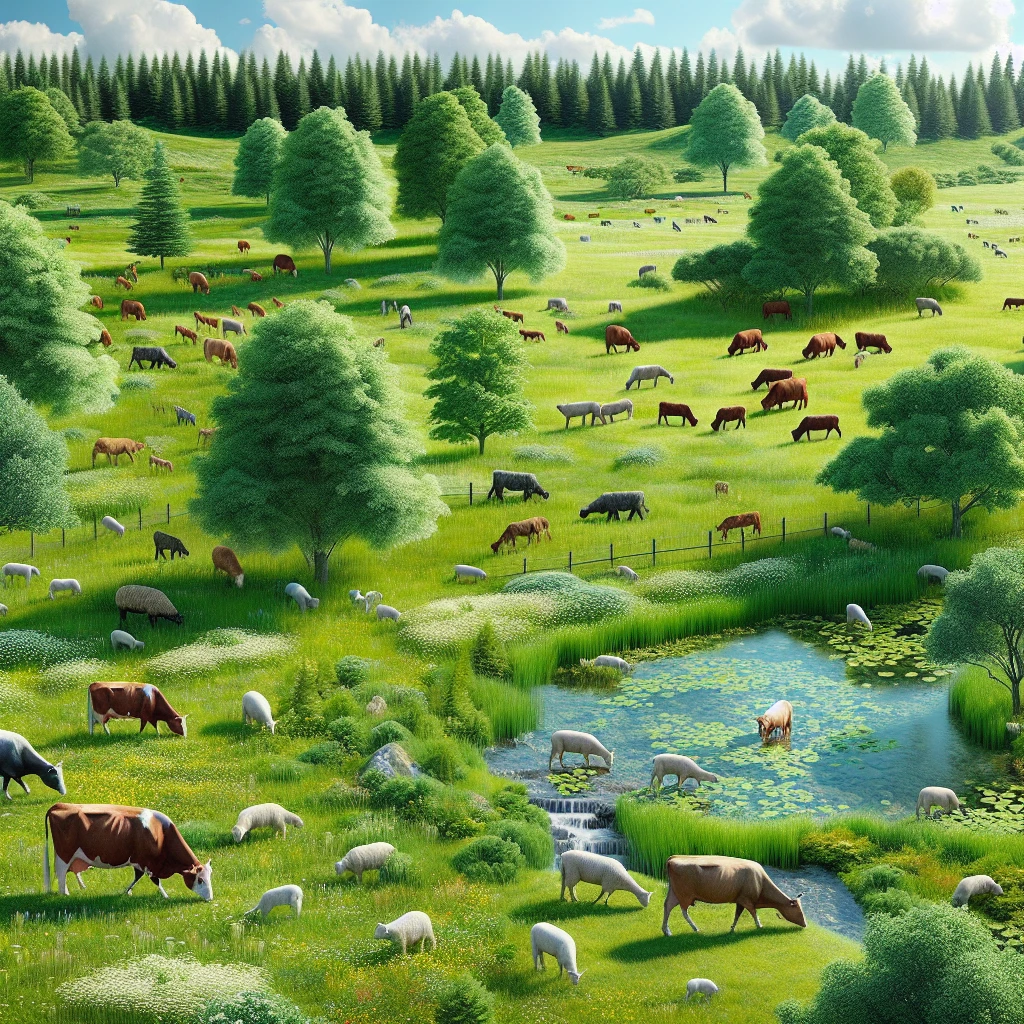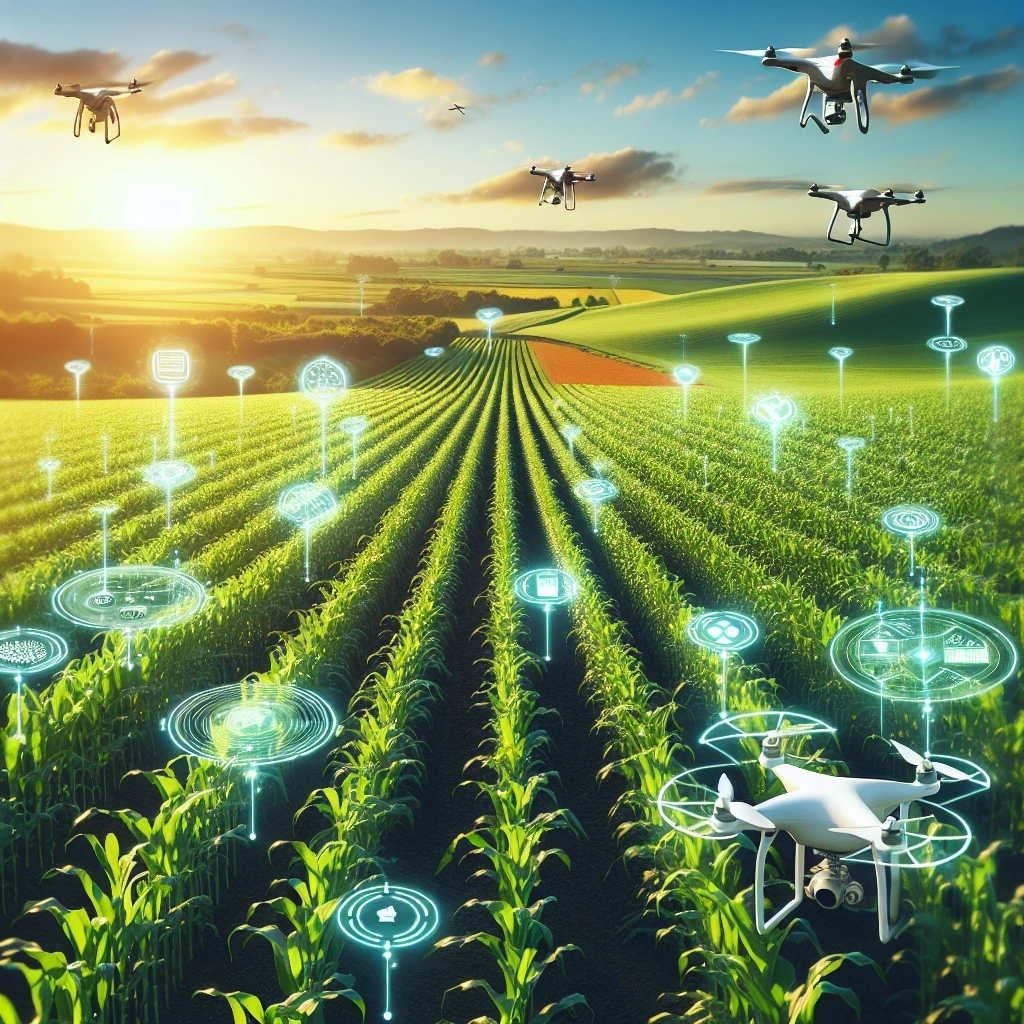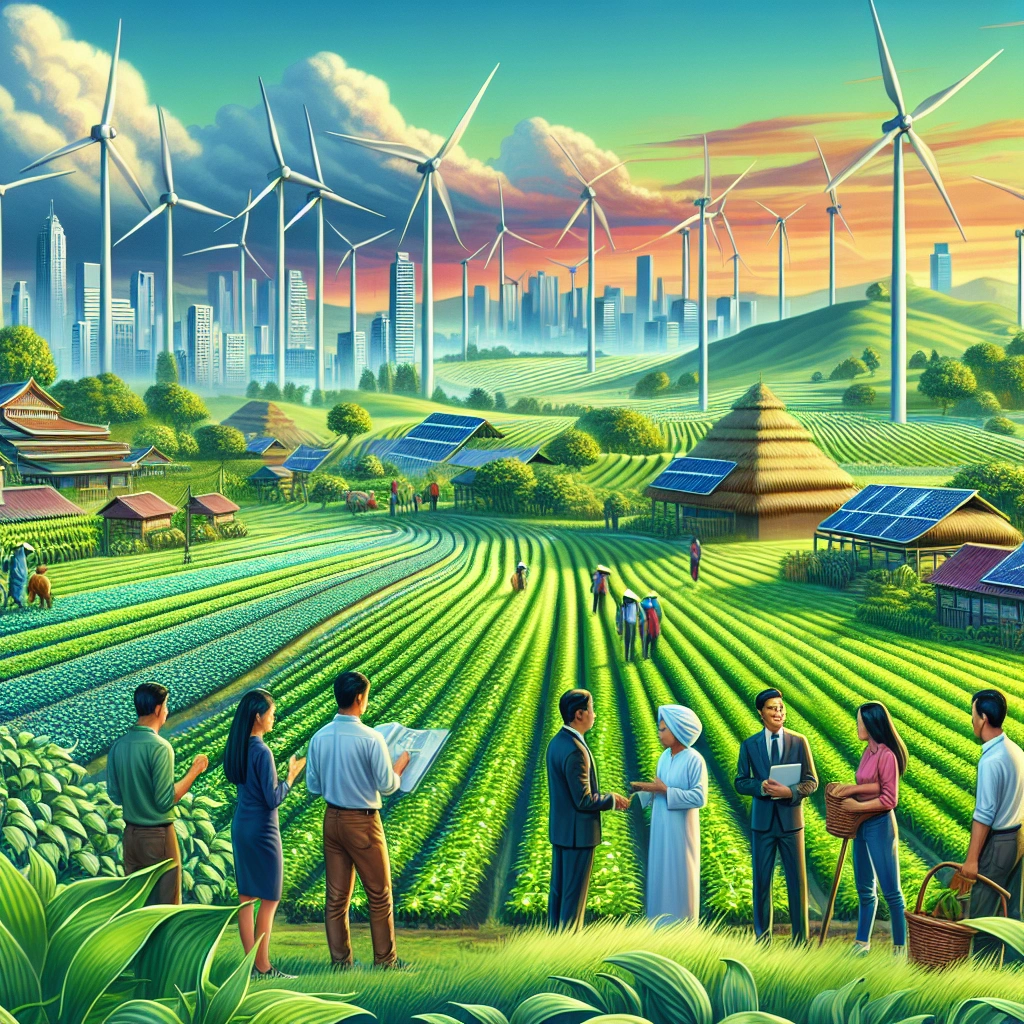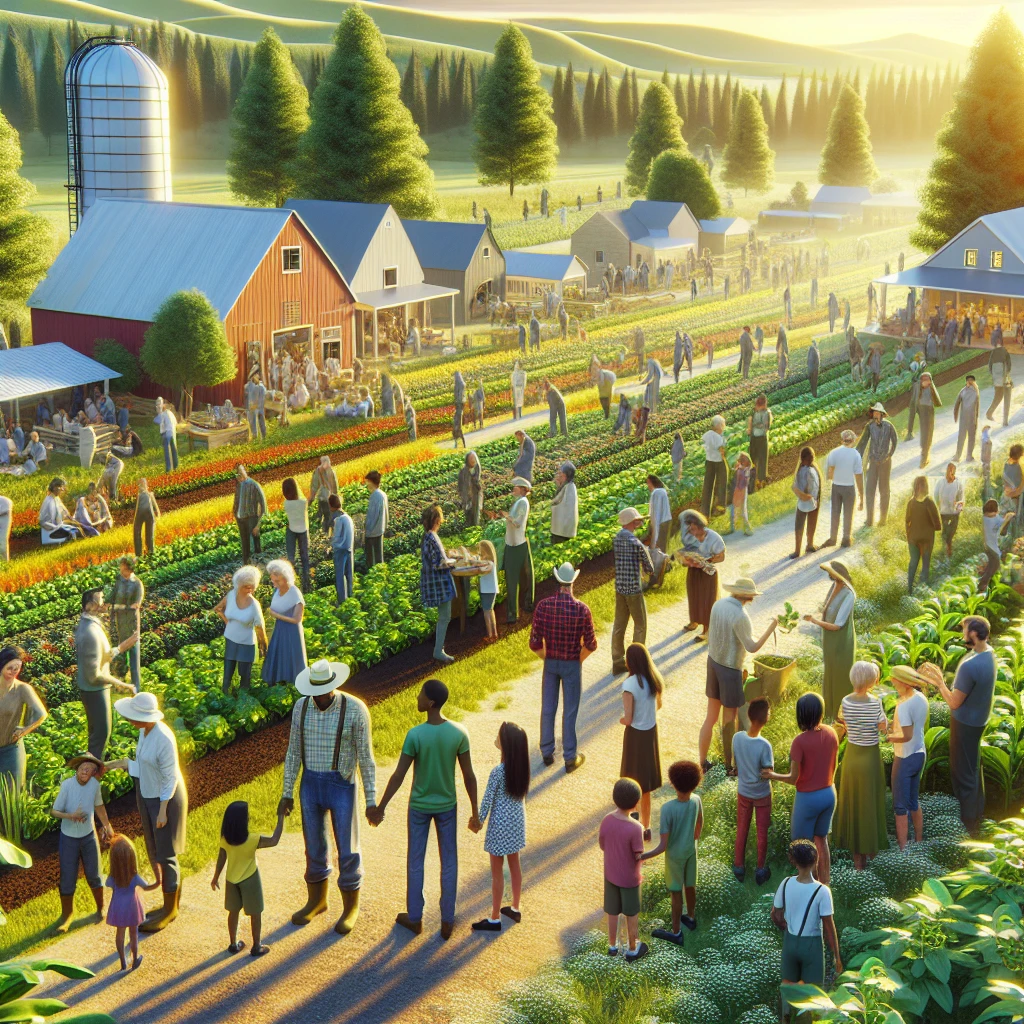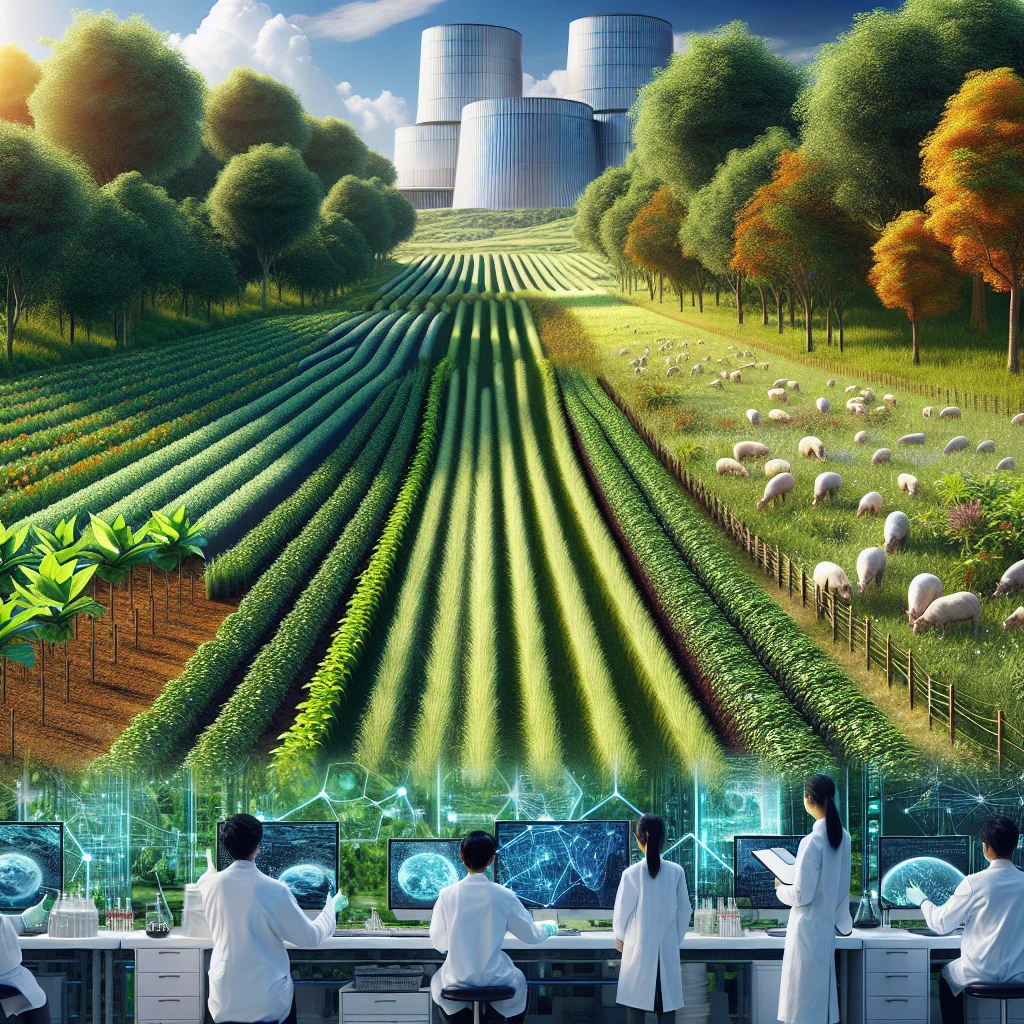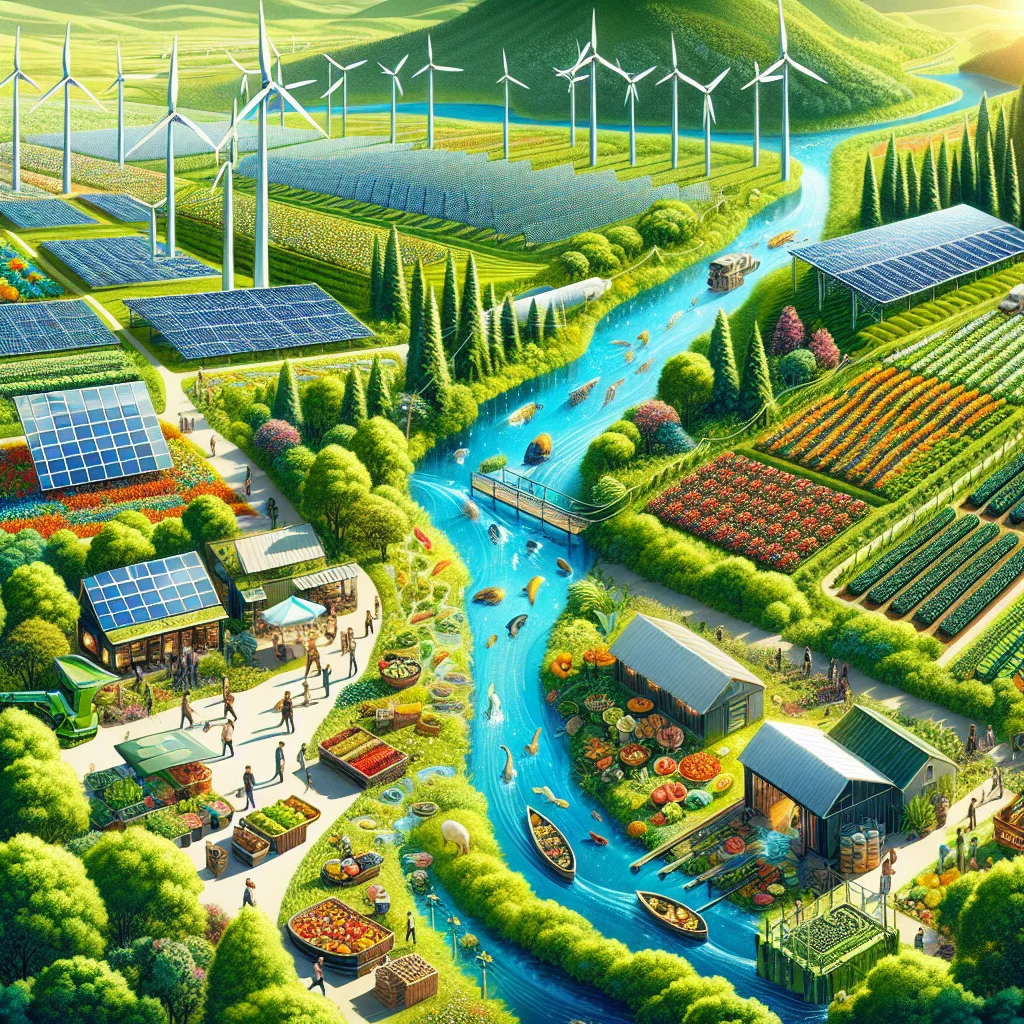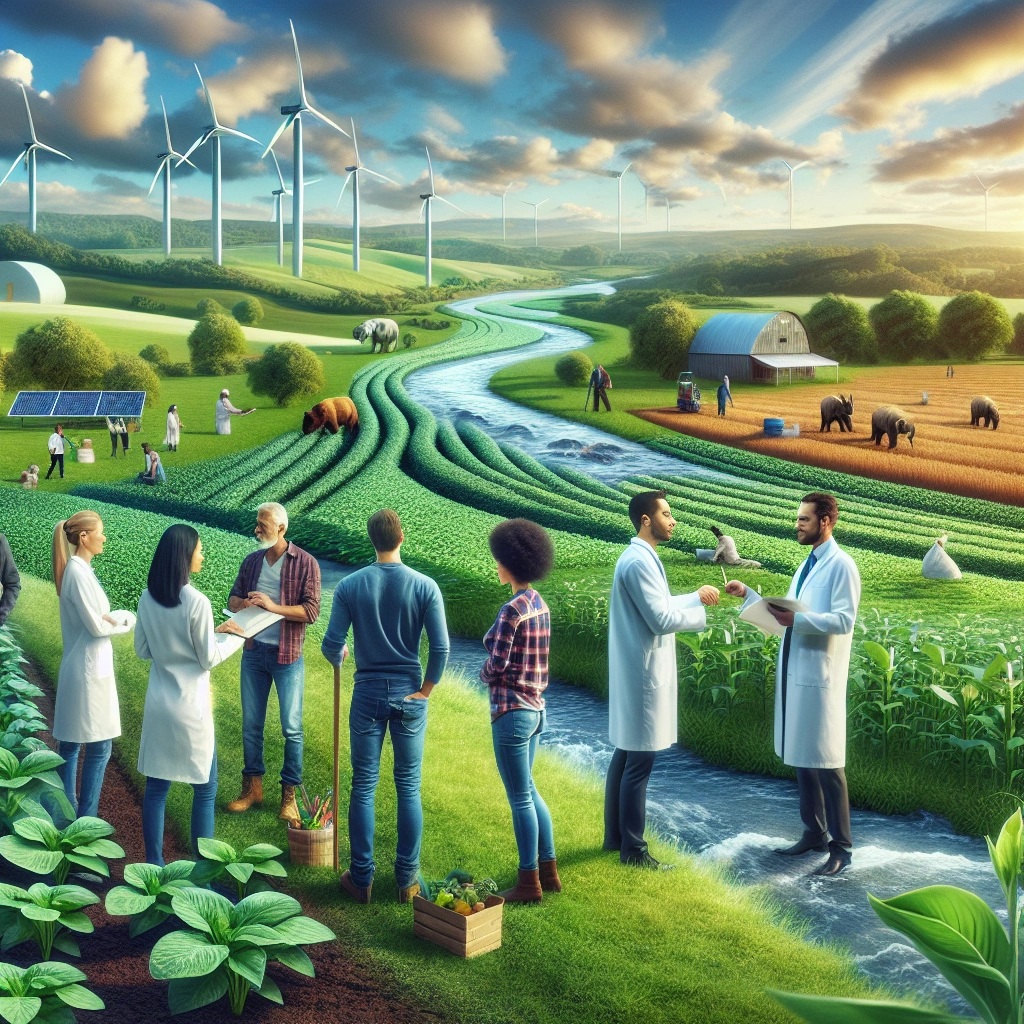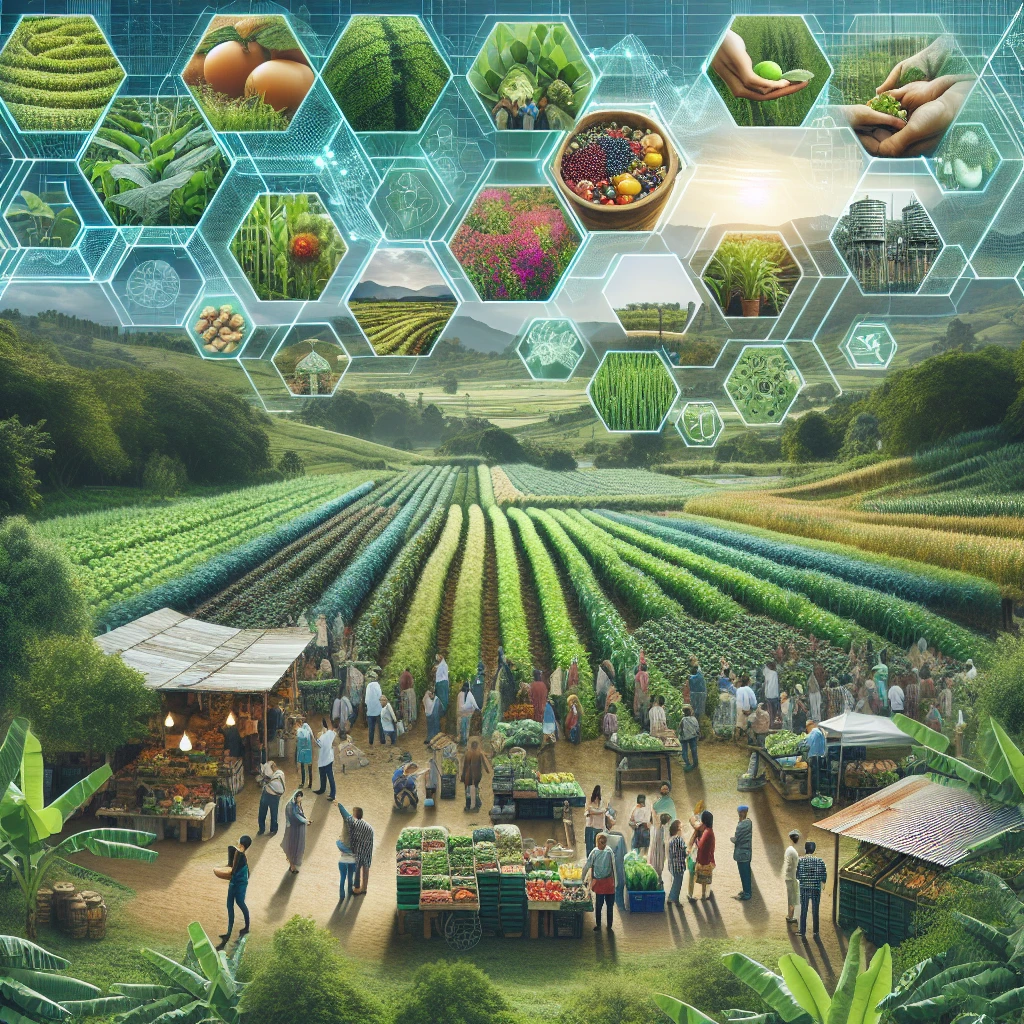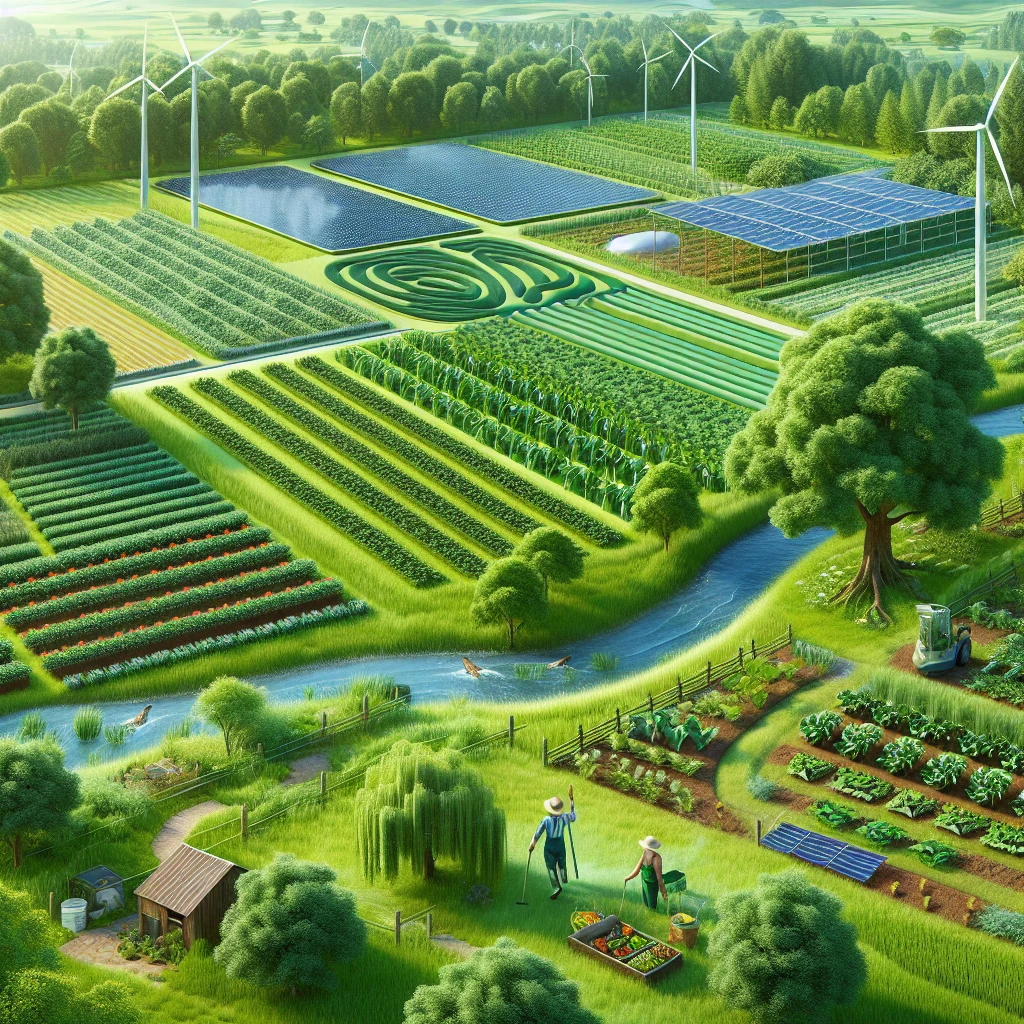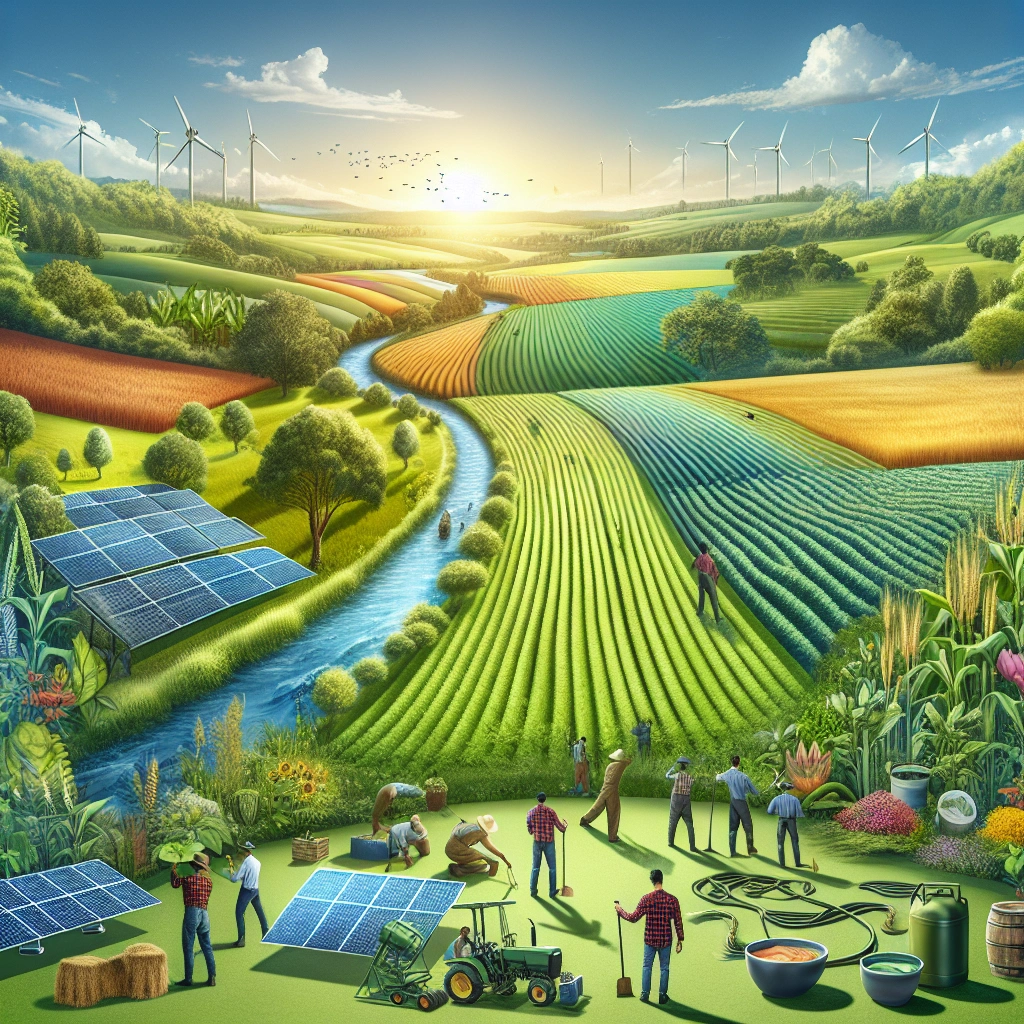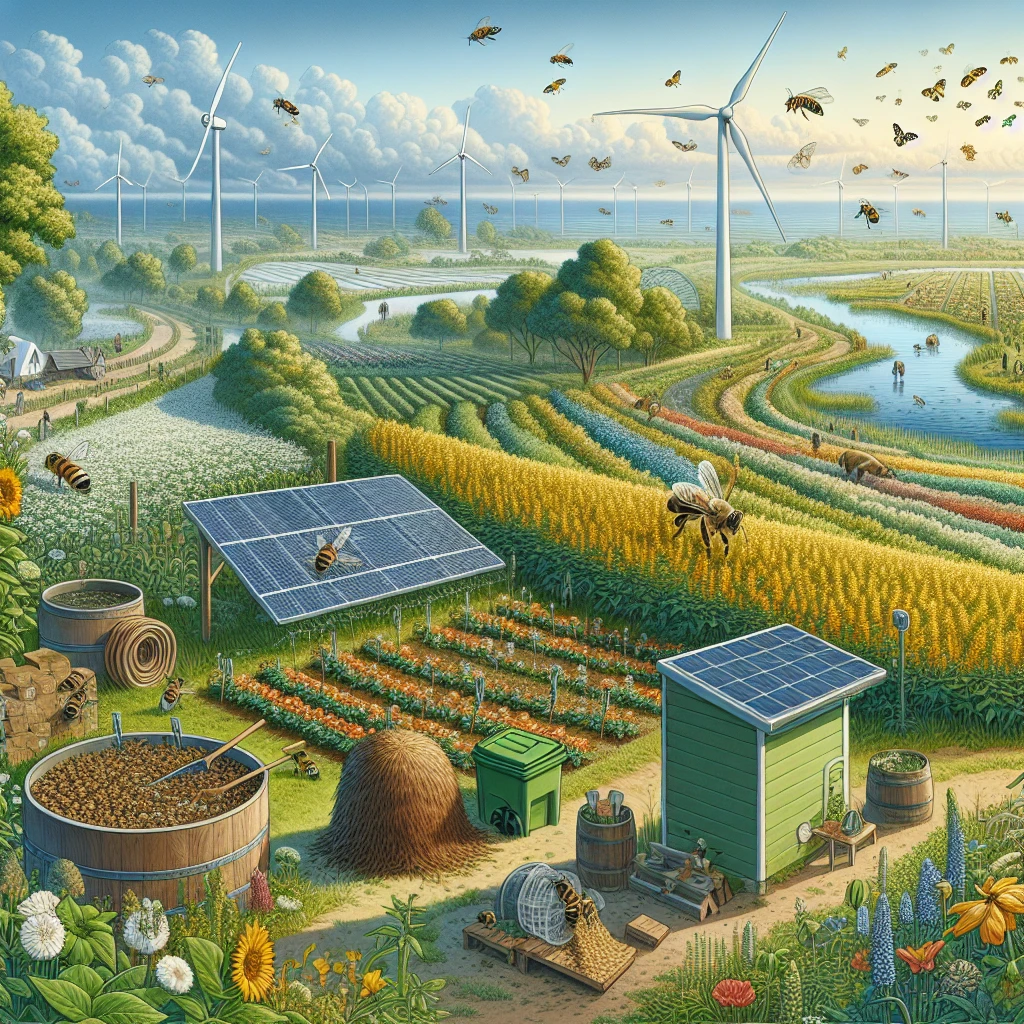

Agriculture has a significant impact on the environment, contributing to pollution of water, air, and soil. This impact is mainly due to the use of pesticides, fertilizers, and other toxic farm chemicals, as well as greenhouse gas emissions from livestock.
It is important to reduce the impact of agriculture on the environment in order to preserve natural resources and minimize the negative effects on ecosystems.
Reducing the impact of agriculture on the environment is crucial for addressing critical environmental issues such as climate change, soil degradation, and deforestation. By implementing sustainable agricultural practices, such as efficient irrigation management, organic farming, and renewable energy use, the negative impact of agriculture can be minimized.
These strategies aim to decrease the use of harmful chemicals, reduce greenhouse gas emissions, and promote soil and water conservation.
In order to mitigate the environmental impact of agriculture, it is essential to promote sustainable farming practices and improve livestock management. By reducing methane emissions from livestock, implementing more efficient rice cultivation methods, and optimizing agricultural management, the overall impact of agriculture on the environment can be significantly reduced.
This is crucial for addressing the threats of climate change and ensuring the long-term sustainability of agricultural operations.
Check out this Youtube video: Learn how agricultural practices can be altered to reduce their impact on the environment and discover ways to promote sustainable farming methods.
Sustainable Farming Practices
Organic and regenerative farming methods focus on regenerating topsoil, improving water retention, and increasing farm profitability. By incorporating these methods, farmers can maintain crop yields, support biosequestration, and enhance overall soil health.
One concrete example of organic and regenerative farming is the use of cover crops and minimal tilling to improve soil fertility and reduce erosion.
Implementing crop rotation and cover cropping can significantly benefit soil health and crop yield. For instance, rotating crops helps increase yields, improves nutrients and organic matter in the soil, and disrupts the lifecycle of crop pests, thereby reducing the need for chemical pesticides.
Additionally, cover crops play a crucial role in controlling erosion, improving water retention, and increasing soil fertility.
Reducing the use of chemical fertilizers and pesticides is essential for sustainable farming practices. A notable alternative to chemical fertilizers is the use of nitrogen-fixing bacteria, such as Pseudomonas chlororaphis, which offers a sustainable option for soil fertility.
Moreover, implementing biological control, such as microbial pesticides and parasitic insects, provides environmentally friendly alternatives to chemical pesticides, benefiting both agricultural sustainability and public health.
| Benefits of Sustainable Farming Practices |
|---|
| Enhanced soil health and water retention |
| Reduced need for chemical fertilizers and pesticides |
| Increased crop yields and profitability |
Efficient Water Management
Implementing drip irrigation systems
Drip irrigation systems are a game-changer for water management in agriculture. By delivering water directly to the plant’s roots, it ensures that no water is wasted on non-essential areas, reducing overall water usage.
Additionally, it prevents soil erosion and reduces weed growth, resulting in healthier foliage and significant water savings. Implementing such a system can lead to more sustainable and efficient agricultural practices, helping to minimize the impact on the environment.
Adopting water-saving technologies
The adoption of water-saving technologies, such as smart irrigation control systems, offers immense potential to reduce water usage in agriculture. These innovative systems utilize local weather data to determine precise irrigation schedules, optimizing water usage and minimizing waste.
By incorporating water-efficient technologies like low-flow faucets and showerheads, significant water savings can also be achieved, contributing to a more sustainable agricultural industry.
Utilizing rainwater harvesting techniques
Rainwater harvesting presents a promising avenue for preserving water resources in agriculture. By capturing and storing rainwater, farmers can reduce their reliance on traditional water sources, thereby minimizing the environmental impact of excessive water extraction.
The implementation of rainwater harvesting systems, such as rooftop collection and rain barrels, offers a practical approach to conserving water and promoting sustainable agricultural practices.
| Technology | Advantages |
|---|---|
| Drip Irrigation | – Precision water delivery – Prevents overwatering – Reduced water usage |
| Smart Irrigation | – Utilizes local weather data – Optimizes irrigation schedule – Minimizes water waste |
| Rainwater Harvesting | – Reduces reliance on traditional water sources – Minimizes environmental impact – Promotes sustainability |
Efficient water management practices, such as drip irrigation, adoption of water-saving technologies, and utilization of rainwater harvesting techniques, are crucial steps towards reducing the impact of agriculture on the environment. Embracing these methods not only conserves water but also contributes to the overall sustainability of agricultural operations.
Remember, “Effective water management today ensures sustainable agriculture for tomorrow!”
Soil Conservation Techniques
Adopting no-till or minimum tillage practices
No-till or minimum tillage practices involve reducing the disturbance of soil through traditional plowing methods. By leaving crop residues on the field, these practices help enhance soil structure, increase water retention, and promote biodiversity, ultimately reducing erosion and improving soil health.
This technique also minimizes fuel usage and labor, contributing to cost savings and environmental sustainability.
Implementing agroforestry to prevent soil erosion
Agroforestry involves the integration of trees, crops, and livestock on the same piece of land. This technique helps prevent soil erosion by providing a protective canopy against wind and rain, conserving moisture through mulch, and reducing runoff and soil loss.
Additionally, agroforestry systems contribute to enhanced carbon assimilation, nutrient cycling, and soil biodiversity, fostering resilient and sustainable agroecosystems.
Encouraging the use of sustainable farming practices to maintain soil health
Encouraging the adoption of sustainable farming practices, such as erosion-control buffers, cover cropping, and crop rotations, plays a crucial role in maintaining soil health. By minimizing soil disturbance, maximizing soil cover and biodiversity, and promoting the presence of living roots, these practices mitigate erosion, improve nutrient cycling, and enhance the resiliency of working lands.
Farmers who embrace these practices can reduce input costs, improve water infiltration, and contribute to the long-term sustainability of agricultural systems.
| Soil Conservation Technique | Key Benefits |
|---|---|
| No-till or minimum tillage practices | Enhance soil structure, increase water retention, promote biodiversity, minimize fuel usage and labor, reduce erosion, and improve soil health. |
| Agroforestry | Prevent soil erosion, conserve moisture, reduce runoff and soil loss, enhance carbon assimilation, nutrient cycling, and soil biodiversity, and promote resilient and sustainable agroecosystems. |
| Sustainable farming practices | Minimize soil disturbance, maximize soil cover and biodiversity, promote the presence of living roots, mitigate erosion, and improve nutrient cycling, ultimately enhancing the resiliency of working lands. |
Biodiversity Conservation
Creating wildlife corridors on farmlands
Wildlife corridors can be established on farmlands by designating specific areas as pathways for animals to migrate and access different habitats. For instance, farms can set aside strips of land with native vegetation to connect fragmented habitats, allowing wildlife to move freely and access essential resources.
These corridors also benefit farmers by promoting natural pest control through the presence of diverse wildlife. By creating these corridors, farmers can contribute to the conservation of biodiversity while maintaining the productivity of their farmlands.
Promoting the use of native plants to support biodiversity
Promoting the use of native plants on farmlands can significantly contribute to supporting local biodiversity. Native plant species are well-adapted to the local ecosystem and provide essential food and habitat for native wildlife.
By incorporating native plants into agricultural landscapes, farmers can create valuable resources for pollinators, birds, and other wildlife, thereby enhancing the overall biodiversity on their farmlands. Additionally, native plants contribute to soil health and water conservation, further benefiting the environment.
Implementing integrated pest management techniques to reduce the use of harmful pesticides
Integrated pest management (IPM) techniques offer a sustainable approach to pest control by minimizing the use of harmful pesticides. By integrating various pest management strategies such as crop rotation, natural predators, and pest-resistant crop varieties, farmers can effectively control pests while reducing reliance on chemical pesticides.
This approach not only protects the environment and wildlife but also promotes long-term agricultural sustainability. Implementing IPM techniques demonstrates a commitment to reducing the environmental impact of agriculture while maintaining crop productivity.
| Wildlife Corridors | Native Plants | Integrated Pest Management |
|---|---|---|
| Connect fragmented habitats | Support local biodiversity | Reduce reliance on harmful pesticides |
| Promote natural pest control | Provide essential food and habitat | Minimize environmental impact |
| Benefit both wildlife and farmers | Contribute to soil health and water conservation | Ensure long-term agricultural sustainability |
Climate-Friendly Livestock Farming
Encouraging grass-fed and pasture-raised livestock production
Grass-fed and pasture-raised livestock production can significantly reduce the environmental impact of agriculture. By encouraging this method, we can minimize the need for fossil fuels in feed production and reduce greenhouse gas emissions associated with traditional feedlot systems.
Studies have shown that grass-fed beef production can lead to lower methane emissions and reduced carbon footprint, making it a more sustainable choice for livestock farming.
Utilizing methane digesters to capture methane emissions
The use of methane digesters is crucial in capturing methane emissions from livestock farming. These anaerobic digesters prevent gases from escaping into the atmosphere by converting methane emissions into biogas, an alternative fuel, and digestate.
By utilizing this technology, we can effectively minimize the environmental impact of methane, a potent greenhouse gas with 25 times more heat-trapping capability than carbon dioxide.
Implementing rotational grazing practices to reduce environmental impact
Implementing rotational grazing practices offers a sustainable approach to reduce the environmental impact of livestock farming. This method allows plants to regrow between grazings, improving soil health and structure, and mitigating greenhouse gas emissions.
Rotational grazing not only enhances carbon sequestration and soil moisture retention but also prevents overgrazing, reducing runoff, limiting soil erosion, and improving water quality.
Precision Agriculture Technologies
Utilizing GPS and satellite imagery for precise farming
Utilizing GPS and satellite imagery in agriculture allows for precise farming practices by providing accurate geospatial data for field mapping, soil sampling, tractor guidance, and crop scouting. These technologies enable farmers to optimize resource management, minimize overlaps in application, and reduce environmental impact by facilitating targeted interventions based on specific field conditions.
For example, the use of satellite imagery can identify areas of water stress or nutrient deficiencies, allowing for precise and efficient resource allocation.
Adopting sensor-based technologies for efficient resource use
Sensor-based technologies play a crucial role in ensuring efficient resource use in agriculture. These technologies offer real-time data on soil quality, moisture content, crop growth, and pest manifestation, enabling farmers to make informed decisions about irrigation, fertilization, and pest control.
For instance, smart sensors equipped with AI technology provide precise information on plant health, facilitating proactive measures to address potential issues and optimize resource utilization, leading to reduced environmental impact and improved sustainability.
Implementing data-driven decision-making processes for sustainable farming
The implementation of data-driven decision-making processes in agriculture contributes to sustainable farming practices by enabling farmers to make informed decisions based on accurate and timely data. By leveraging data analytics, farmers can optimize resource allocation, streamline operations, and minimize environmental impact.
For example, recording climate parameters allows for optimal irrigation timing, improved water management, and enhanced crop productivity, which ultimately leads to more sustainable agricultural practices.
| Precision Agriculture Technologies | Key Benefits |
|---|---|
| Utilizing GPS and satellite imagery | Accurate geospatial data for targeted interventions |
| Sensor-based technologies | Real-time data for precise resource utilization |
| Data-driven decision-making processes | Informed decisions for sustainable farming |
These technologies collectively contribute to reducing the impact of agriculture on the environment by promoting efficient resource use, minimizing waste, and optimizing agricultural practices for long-term sustainability.
These technologies collectively contribute to reducing the impact of agriculture on the environment by promoting efficient resource use, minimizing waste, and optimizing agricultural practices for long-term sustainability.
Agroecology and Permaculture
Incorporating agroecological principles into farming practices
Agroecological principles can be incorporated into farming practices by emphasizing biodiversity, promoting the natural balance of ecosystems, and reducing the reliance on chemical inputs. For example, farmers can implement crop rotation, intercropping, and agroforestry to maximize the use of resources and minimize negative environmental impacts.
Implementing permaculture design for sustainable food production
Permaculture design can be implemented by creating self-sustaining food production systems that mimic natural ecosystems. This includes designing perennial and annual plant varieties, integrating livestock, and utilizing efficient water management techniques such as rainwater harvesting and irrigation systems.
Promoting biodiversity and ecological harmony in agriculture
Promoting biodiversity and ecological harmony in agriculture involves preserving natural habitats, using native plant species, and reducing monoculture farming. By maintaining a diverse ecosystem, it is possible to enhance ecological resilience, soil fertility, and natural pest control, thereby reducing the environmental impact of agriculture.
Government Policies and Incentives
Advocating for sustainable agriculture policies
The government is actively pushing for sustainable agriculture policies to reduce the environmental impact of farming. By advocating for soil conservation, water protection, and wildlife habitat preservation, new policies aim to promote eco-friendly farming practices.
These policies encourage techniques like crop rotation, organic farming, and agroforestry, which contribute to soil health and reduce the need for synthetic fertilizers and pesticides. Advocating for sustainable agriculture policies is crucial for mitigating the environmental impact of agricultural activities.
Providing subsidies for eco-friendly farming practices
Incentivizing eco-friendly farming practices through subsidies is a key component of government initiatives to reduce agriculture’s environmental impact. By providing financial support for practices such as reduced tillage, cover cropping, and precision agriculture, farmers are encouraged to adopt methods that promote soil health, conserve water resources, and minimize pollution.
These subsidies play a pivotal role in promoting the adoption of sustainable farming techniques and reducing the overall environmental footprint of agriculture.
Enforcing regulations to reduce environmental impact
Regulatory enforcement is vital in reducing the environmental impact of agriculture. By implementing rules for controlling excessive fertilizer and pesticide use, managing agricultural runoff, and preserving natural habitats, the government aims to minimize environmental degradation caused by farming activities.
Additionally, stringent regulations on greenhouse gas emissions from livestock and machinery are being enforced to combat climate change. Enforcing these regulations is crucial for ensuring sustainable agricultural practices and mitigating the industry’s environmental impact.
| Sustainable Agriculture Policies | Subsidies for Eco-Friendly Farming Practices | Enforced Environmental Regulations |
|---|---|---|
| Soil Conservation | Reduced Tillage | Control of Fertilizer Use |
| Water Protection | Cover Cropping | Management of Agricultural Runoff |
| Wildlife Habitat Preservation | Precision Agriculture | Regulation of Greenhouse Gas Emissions |
Consumer Education and Awareness
Educating consumers about the impact of their food choices
It’s crucial to educate consumers about the impact of their food choices on the environment. For instance, we can highlight the carbon footprint of different food products and explain how certain choices contribute to greenhouse gas emissions.
By providing clear and accessible information, consumers can make more informed decisions about their dietary habits and understand the environmental implications of their food choices.
Promoting sustainable food production and consumption behaviors
Promoting sustainable food production and consumption involves advocating for methods that minimize environmental impact. For instance, we can encourage the consumption of locally grown produce to reduce transportation emissions and support sustainable farming practices.
Additionally, highlighting the benefits of organic farming and its positive impact on soil health and biodiversity can further promote sustainable consumption behaviors.
Encouraging support for local and sustainable agriculture
Encouraging support for local and sustainable agriculture relies on fostering appreciation for locally sourced products and the positive impact on the community and environment. By showcasing the benefits of supporting local farmers, such as reduced carbon emissions from transportation and the preservation of agricultural diversity, consumers can be encouraged to choose sustainable agricultural products.
Research and Innovation
The key to reducing the impact of agriculture on the environment lies in investing heavily in research for sustainable agricultural practices. This involves funding initiatives focused on regenerative agriculture techniques such as cover cropping, crop rotation, and reduced tillage, which have proven to enhance soil health and contribute to a more eco-friendly agricultural ecosystem.
Furthermore, developing innovative solutions for environmental challenges is paramount. By leveraging cutting-edge technologies like AI for optimizing farming strategies, improving crop quality, and managing biological capital, the industry can significantly mitigate its environmental footprint.
Collaborating with academic institutions and industry partners for sustainable agriculture is crucial in this endeavor. Establishing partnerships and knowledge exchange programs enable the seamless transfer of groundbreaking research findings into practical, sustainable farming methods.
By investing in research for sustainable agricultural practices, developing innovative solutions for environmental challenges, and fostering collaborations with academic institutions and industry partners, we can collectively work towards reducing the impact of agriculture on the environment.
| Initiative | Description |
|---|---|
| Sustainable Agriculture Practices | Emphasis on regenerative agriculture techniques |
| Innovative Environmental Solutions | Utilizing AI for crop optimization and environmental impact management |
| Collaboration for Sustainable Agriculture | Partnerships and knowledge exchange programs for seamless research implementation |
This comprehensive approach will play a pivotal role in addressing the environmental concerns associated with modern agricultural practices.
Economic Considerations
Evaluating the economic viability of sustainable agriculture
Sustainable agriculture offers long-term economic benefits through reduced reliance on chemical inputs and machinery, resulting in cost savings and enhanced natural resource conservation. By focusing on natural methods, sustainable farming minimizes the need for harmful chemicals, promoting cleaner air and water resources.
This not only leads to economic savings for farmers by reducing fuel and waste but also aligns with consumer demand, boosting profitability in the long run.
Balancing economic incentives with environmental preservation
Effective economic incentives can support a shift to sustainable and equitable agriculture by linking programs to productivity and profitability, thus encouraging the adoption of environmentally friendly practices. By showcasing how sustainable agriculture can result in financial prosperity, farmers are motivated to balance economic incentives with environmental preservation, ensuring a win-win situation for both economy and environment.
Showcasing success stories of financially prosperous sustainable farms
Success stories of financially prosperous sustainable farms highlight the correlation between sustainable practices and economic success. For instance, a Florida cabbage farm improved yields, water efficiency, and nutrient management through conservation practices, leading to increased profit.
Additionally, organizations promoting regenerative agriculture are driving the adoption of sustainable practices, contributing to both financial prosperity and environmental preservation.
| Farms | Financial Prosperity | Sustainable Practices |
|---|---|---|
| Florida Cabbage Farm | Improved yields and profit | Enhanced water and nutrient management through conservation practices |
| Regenerative Agriculture Organizations | Driving adoption of sustainable practices | Balancing economic gains with environmental preservation |
These examples demonstrate the economic viability of sustainable agriculture, the successful balancing of economic incentives with environmental preservation, and the financial prosperity achieved through sustainable farming practices.
Industry Collaboration
Engaging with food industry stakeholders for sustainable supply chains
Engaging with food industry stakeholders for sustainable supply chains is crucial in reducing the impact of agriculture on the environment. By collaborating with suppliers, farmers, and distributors, we can ensure the ethical and sustainable sourcing of ingredients, leading to a reduction in environmental footprint.
For instance, partnering with suppliers who champion sustainability can pave the way for integrating sustainable initiatives into the supply chain, thereby positively impacting the environment.
Encouraging partnerships for sustainable sourcing and production
Encouraging partnerships for sustainable sourcing and production within the food industry is imperative for reducing the environmental impact of agriculture. For example, fostering alliances with food manufacturers and suppliers facilitates the design of efficient supply chain networks, enabling the sourcing of raw materials while minimizing the impact on the environment.
This collaboration can lead to increased profits, decreased production costs, and improved brand loyalty while promoting sustainability.
Creating alliances for sustainable agriculture advocacy
Creating alliances for sustainable agriculture advocacy is a critical step in addressing the environmental impact of agriculture. By building partnerships with national and global leaders, we can drive a transformation in the agricultural sector through market-based approaches.
This collaborative effort among stakeholders, including farmers, businesses, and policymakers, can leverage resources and scale existing efforts for sustainable agriculture. The goal is to advocate for the sustainability of agriculture, food systems, natural resources, and rural communities, leading to positive environmental outcomes.
| Collaboration Focus | Environmental Impact |
|---|---|
| Sustainable Supply Chains | Ethical sourcing, reduced environmental footprint |
| Sustainable Sourcing and Production | Increased profits, decreased production costs, improved brand loyalty |
| Sustainable Agriculture Advocacy | Transformation of agricultural sector, resource leverage, advocacy for sustainability |
These collaborative efforts are essential for driving positive change and reducing the environmental impact of agriculture through sustainable practices and advocacy.
Monitoring and Evaluation
Implementing systems to monitor environmental impact
Implementing systems to monitor environmental impact is crucial in reducing the impact of agriculture on the environment. Real-time environmental monitoring systems, such as leak detection and pollution monitoring, can help identify potential environmental hazards and enable timely intervention to minimize negative effects.
For example, deploying sensors to monitor air and water quality on agricultural lands can provide valuable data to inform sustainable farming practices and mitigate environmental impact.
Establishing benchmarks for sustainable agriculture practices
Establishing benchmarks for sustainable agriculture practices involves setting clear goals and indicators to measure the environmental impact of farming activities. This could include benchmarking farm productivity and sustainability to track the use of regenerative agriculture methods, crop diversity, and water conservation.
By comparing current practices against established benchmarks, farmers can identify areas for improvement and implement more sustainable and eco-friendly agricultural techniques. This can contribute to reducing the overall environmental impact of agriculture in the long run.
Evaluating the effectiveness of implemented strategies
Evaluating the effectiveness of implemented strategies in reducing the impact of agriculture on the environment is essential for ensuring ongoing progress. By developing a comprehensive evaluation blueprint and data collection system, stakeholders can measure the outcomes of their sustainability strategies accurately.
This involves assessing the environmental impact over time and setting targets for change based on the collected data. Through systematic evaluation, agriculture businesses and organizations can continuously adapt their sustainability strategies to achieve positive environmental outcomes.
| Environmental Monitoring Systems | Sustainable Agriculture Benchmarks | Evaluation of Strategies |
|---|---|---|
| Real-time sensor technology | Crop diversity and water usage | Comprehensive data |
| Pollution monitoring | Regenerative agriculture methods | Ongoing assessment |
| Air and water quality sensors | Productivity and sustainability | Adaptation for improvements |
Monitoring and evaluating the environmental impact of agricultural activities plays a significant role in reducing the overall impact of agriculture on the environment. By implementing robust monitoring systems, establishing sustainable benchmarks, and evaluating the effectiveness of strategies, agriculture can be more environmentally conscious and contribute to a healthier planet for future generations.
Addressing Food Security
Ensuring that environmental conservation efforts do not compromise food security
The challenge of ensuring that environmental conservation efforts do not compromise food security is a complex one. It involves finding a delicate balance between implementing sustainable agricultural practices and preserving natural ecosystems while ensuring continued access to nutritious food for all.
One approach is to promote agroecology, which focuses on the use of environmentally-friendly farming techniques to increase productivity without harming the environment. For example, promoting the use of organic fertilizers and natural pest control methods can help maintain crop yields while minimizing the impact on the environment.
Developing strategies to address food access and sustainability
Developing strategies to address food access and sustainability requires a multi-faceted approach that encompasses various aspects of the food system. This includes promoting local food production through community gardens and urban farming initiatives to improve access to fresh produce in underserved areas.
Additionally, investing in infrastructure and technology for small-scale farmers to enhance their productivity and reduce food waste can contribute to long-term sustainability. Moreover, education and awareness campaigns can empower individuals to make informed choices about food consumption and waste management, contributing to overall sustainability.
Balancing the need for environmental preservation with the need to feed the growing population
Balancing the need for environmental preservation with the need to feed the growing population is an urgent global priority. It requires innovative solutions such as vertical farming and hydroponics, which maximize space and resources while minimizing environmental impact.
Furthermore, integrating agroforestry and perennial crop cultivation into traditional farming practices can help mitigate deforestation and soil degradation while meeting the increasing demand for food. Leveraging advancements in biotechnology to develop drought-resistant and high-yielding crop varieties is also crucial in sustainably addressing the nutritional needs of a growing population.
| Strategy | Approach |
|---|---|
| Agroecology | Promoting environmentally-friendly farming techniques |
| Community gardens and urban farming | Enhancing access to fresh produce in underserved areas |
| Investment in small-scale farming | Improving productivity and reducing food waste |
| Education and awareness campaigns | Empowering individuals to make informed choices about food consumption and waste management |
| Vertical farming and hydroponics | Maximizing space and resources while minimizing environmental impact |
| Agroforestry and perennial crop cultivation | Mitigating deforestation and soil degradation |
| Biotechnology for crop development | Developing drought-resistant and high-yielding crop varieties |
This approach ensures that environmental conservation efforts align with the goal of achieving food security and sustainability, striking a harmonious balance between humanity’s nutritional needs and the protection of our planet’s essential resources.
Addressing Global Challenges
Recognizing the global nature of environmental impact
The environmental impact of agriculture is a global issue that transcends borders and affects the entire planet. From deforestation to pollution, the practices and processes of agriculture have a significant impact on the environment worldwide.
Recognizing this global nature of environmental impact is crucial in addressing the challenges associated with agriculture and its consequences. By understanding that the effects of agriculture extend beyond local or national boundaries, we can work towards implementing solutions that have a meaningful, lasting impact on the environment.
Collaborating with international partners for sustainable agriculture
Collaborating with international partners is essential for promoting sustainable agriculture practices on a global scale. Through partnerships with organizations and stakeholders from various countries, we can share knowledge, best practices, and resources to develop and implement sustainable agriculture techniques.
By collaborating with international partners, we can leverage a diverse range of expertise, perspectives, and resources to address the environmental challenges associated with agriculture, leading to a more comprehensive and impactful approach to sustainable agriculture.
Developing strategies to address environmental challenges on a global scale
Developing strategies to address environmental challenges on a global scale requires a multifaceted approach that encompasses various aspects of agriculture, environmental conservation, and resource management. This can include initiatives such as promoting the use of renewable energy sources, conservation of forests, and the adoption of sustainable agriculture practices.
Additionally, implementing policies to reduce carbon emissions, protect biodiversity, and minimize environmental harm from agricultural practices is crucial. By developing comprehensive strategies that address the environmental challenges associated with agriculture, we can work towards creating a more sustainable and harmonious relationship between agriculture and the environment.
| Strategy | Description |
|---|---|
| Renewable Energy Sources | Promoting the use of renewable energy sources to reduce carbon emissions and environmental impact. |
| Conservation of Forests | Implementing initiatives to protect and conserve forests, crucial for biodiversity and environmental balance. |
| Sustainable Agriculture Practices | Advocating for the adoption of sustainable agriculture practices to minimize environmental harm and promote long-term sustainability. |
Addressing the global challenges related to agriculture and its impact on the environment requires a collective effort, international collaboration, and the implementation of comprehensive strategies that prioritize sustainability and environmental conservation on a global scale. Through recognition of the global nature of these challenges and the development of collaborative strategies, we can work towards a more sustainable future for agriculture and the environment.
Recommended Amazon Products for Reducing the Impact of Agriculture on the Environment
Here’s a curated list of products that can help reduce the impact of agriculture on the environment. These recommendations are based on environmental sustainability, positive customer reviews, and popular brand reputation.
Organic Fertilizer
Organic fertilizers promote soil health and minimize environmental impact. The Dr. Earth Organic 5 Tomato, Vegetable & Herb Fertilizer is a highly recommended option for sustainable agricultural practices. You can find the Dr. Earth Organic 5 Tomato, Vegetable & Herb Fertilizer on Amazon here.


Pros and Cons of Organic Fertilizer:
| Pros | Cons |
|---|---|
| Environmentally friendly | May be more expensive than synthetic fertilizers |
| Supports soil biodiversity | Slow release may require more frequent applications |
Drip Irrigation System
Efficient water management is crucial for sustainable farming. The Rain Bird 32ETI Easy to Install In-Ground Automatic Sprinkler System Kit minimizes water wastage and promotes eco-friendly irrigation practices. You can find the Rain Bird 32ETI Easy to Install In-Ground Automatic Sprinkler System Kit on Amazon here.


Pros and Cons of Drip Irrigation System:
| Pros | Cons |
|---|---|
| Reduced water usage | Initial installation may require effort |
| Precise watering | Potential for clogging in the drip lines |
Rotational Grazing Kit
For climate-friendly livestock farming, rotational grazing practices are essential. The Gallagher G70000 Smart Fence 2 is ideal for managing grazing areas and promoting sustainable land use. You can find the Gallagher G70000 Smart Fence 2 on Amazon here.


Pros and Cons of Rotational Grazing Kit:
| Pros | Cons |
|---|---|
| Improved pasture health | Requires familiarity with electric fencing |
| Supports grazing rotation | Initial investment in fencing equipment |
Precision Agriculture Drone
Utilizing precision agriculture technologies can enhance resource efficiency. The DJI Agras MG-1P RTK Agricultural Spraying Drone enables targeted application of inputs, reducing wastage and environmental impact. You can find the DJI Agras MG-1P RTK Agricultural Spraying Drone on Amazon here.


Pros and Cons of Precision Agriculture Drone:
| Pros | Cons |
|---|---|
| Precision in pesticide application | Initial cost and training requirements |
| Efficient pesticide use | Limitations in high wind conditions |
Consumer Education Book
Educating consumers about sustainable food choices is crucial. The book “The Omnivore’s Dilemma” by Michael Pollan offers valuable insights into the impact of food production on the environment. You can find “The Omnivore’s Dilemma” by Michael Pollan on Amazon here.


Pros and Cons of Consumer Education Book:
| Pros | Cons |
|---|---|
| Informative and eye-opening | Not a physical product for farming |
| Raises awareness | Requires reader engagement |
Top Recommended Product for Reducing the Impact of Agriculture on the Environment
If you’re looking for the best solution for reducing the impact of agriculture on the environment, we highly recommend the Dr. Earth Organic 5 Tomato, Vegetable & Herb Fertilizer. This organic fertilizer promotes soil health, supports biodiversity, and aligns with sustainable farming practices, making it a top choice for environmentally conscious agriculture.
Ready to improve the environmental impact of agriculture? Check out the Dr. Earth Organic 5 Tomato, Vegetable & Herb Fertilizer on Amazon today for the best results!


Conclusion
Reducing the impact of agriculture on the environment can be achieved through the adoption of sustainable farming practices. This includes the use of organic farming methods, crop rotation, and the reduction of chemical inputs to minimize the environmental impact of agriculture.
Furthermore, promoting agroecology and agroforestry can help to reduce the impact of agriculture on the environment. These methods focus on integrating trees, shrubs, and crops to improve soil health, minimize erosion, and promote biodiversity, leading to a more sustainable agricultural system.
Implementing effective land management practices, such as conservation tillage and cover cropping, can play a crucial role in reducing the impact of agriculture on the environment. By prioritizing soil health, water conservation, and biodiversity, these practices can contribute to a more sustainable and environmentally friendly approach to farming.

